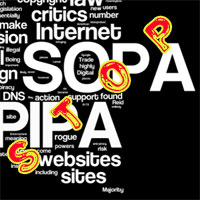 If you own or operate a website you should already know about the SOPA bill. It is a draconian law, now infamous, that can have devastating effect in the future of internet and its freedom. The SOPA law was proposed for the benefits of intellectual property owners (read big Hollywood movie producers and Record labels) so they can take down any content or website that they deem “fair” by forcing the ISPs, hosting companies and search engines. The main problem is that the proposed law is extremely vague and can open a flood gate for internet policing. Not only that, it will also open huge opportunities for black hat marketeers and the bad guys to abuse small time businesses.
If you own or operate a website you should already know about the SOPA bill. It is a draconian law, now infamous, that can have devastating effect in the future of internet and its freedom. The SOPA law was proposed for the benefits of intellectual property owners (read big Hollywood movie producers and Record labels) so they can take down any content or website that they deem “fair” by forcing the ISPs, hosting companies and search engines. The main problem is that the proposed law is extremely vague and can open a flood gate for internet policing. Not only that, it will also open huge opportunities for black hat marketeers and the bad guys to abuse small time businesses.
If you are somehow related to web development industry or marketing websites, you should be definitely concerned by the advent of the SOPA bill and whether it goes through or not. Although the bill of act is aimed primarily at websites based outside of the U.S.A, the language in the proposed legislation is intentionally made broad and vague – often referencing “U.S.-directed websites”. So in reality, it does not matter where the website in question really is – websites based in the U.S. could be subject to the same measures and penalties as foreign websites. And of course, forget about the fairness about the “foreign” sites. The SOPA bill is written in a manner so that even if the big companies do not “own” an intellectual property they can force it down from the web just because they thought so. The act also grants overwhelming powers to the U.S. government which is a major cause of concern about government-mandated censorship which is utterly undesirable for the sake of internet freedom.
The moderately good news and a small comfort is that the Bill has been temporarily shelved. Read more about it here. The overwhelming outcry of internet community caused White House to NOT support the bill. Though its twin brother PIPA – Protect IP Act, is still very much alive.
SOPA and PIPA are essentially the two sides of the same coin. They have the same goals, and much of the same provisionsl. The wording of each section is often only slightly different, though the meaning is the same, making these differences meaningless in actuality. PIPA lacks a provision that forces search engines (like Google and Bing) to remove a “foreign (outside of USA) infringing site” from their indexes. PIPA also contains provisions that require stronger and more elaborate court intervention to go after an accused website. PIPA is, in a way, more disastrous because it does not contain any provisions that would penalize copyright holders for misrepresenting the alleged infringing activities of an accused website — a potentially disastrous omission for innocent websites put through the PIPA tunnel. SOPA is slightly better as it does contain a provision that penalizes those copyright holders who “knowingly materially misrepresent” the alleged infringement of a website by making them “liable for damages, including costs and attorneys’ fees, incurred by the person injured by such misrepresentation as a result of the misrepresentation.” The “vigilante” part of SOPA/PIPA, that allows ISPs to voluntarily block access to certain foreign websites without court orders and just, “in good faith,” if they have “credible evidence” that these sites are devoted to illegally distributing copyrighted material is extremely concerning. Both SOPA and PIPA give unbridled immunity to ISPs who take voluntary actions against websites that are believed — but not proven — by the ISPs to be dedicated to the illegal distribution of intellectual property. Because of this the potential to abuse this power is unconscionable and many many will abuse this power.
We do not want SOPA. We do not want PIPA. We want fair use of internet and its freedom. Stop SOPA. Stop PIPA.
Many major websites are “going black” in an effort to show their visitors what could happen if the SOPA bill was passed. One of the most vocal voices against SOPA has been Reddit founder, Alexis Ohanian. Reddit, a site that features socially driven news stories (and 2 billion pageviews a month!) scheduled a blackout on Jan 18th and urged others to do so as well. Other websites that came on board were Tucows, the Cheezburger network, and Wikipedia blackout. Though neither Google nor Facebook showed official support for the blackouts, which is kind of sad in my opinion.

The blackouts have been proposed for a 12 hour span (8 AM – 8 PM EST on January 18th), and webmasters have been urged to participate.



Leave a Reply